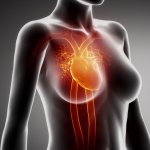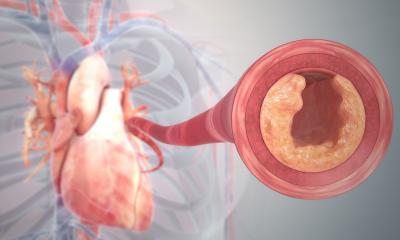News • Cardiac disease research
Endometriosis associated with increased risk for heart attack, stroke
According to research presented at the European Society of Cardiology's (ESC) 2024 congress, women with endometriosis have a 20% greater risk of significant cardiac outcomes compared with women without endometriosis.

© chajamp – stock.adobe.com
“For decades, cardiovascular disease (CVD) has been thought of as a man’s disease and risk factors have been considered from the male perspective, for example, including erectile dysfunction in guidelines on CVD risk assessment. Yet, 1 in 3 women die from CVD and 1 in 10 women suffer from endometriosis. Our results suggest that it may be time to routinely consider the risk of CVD in women with endometriosis,” said lead study author, Dr. Eva Havers-Borgersen from Rigshospitalet Copenhagen University Hospital, Copenhagen, Denmark.
The study used Danish nationwide registries of all women with a diagnosis of endometriosis between 1977 and 2021. They were matched with women from the background population without endometriosis in a 1:4 ratio based on year of birth. The primary outcome was a composite of acute myocardial infarction and ischaemic stroke. The secondary outcomes were the individual components of the primary outcome, as well as arrhythmias, heart failure and mortality.
There were 60,508 women with endometriosis and 242,032 matched controls included in the analysis (median age, 37.3 years) who were followed for a median of 16 years and a maximum of 45 years.
Recommended article

Article • Sex differences in heart failure
Why a closer look at a woman’s heart matters
The hearts of men and women are different – while this insight has been established for quite some time now, it might even surprise cardiologists just how deep these differences really run. In her presentation at this year’s ESC, Diana Bonderman, MD, gave a comprehensive roundup on sex differences in risk factors and subtypes of heart failure.
Women with endometriosis had around a 20% increased risk of the composite endpoint of acute myocardial infarction and ischaemic stroke compared with those without endometriosis (unadjusted hazard ratio [HR] 1.18; 95% confidence interval [CI] 1.14−1.23; adjusted HR 1.15; 95% CI 1.11−1.20). The 40-year cumulative incidence of the composite of acute myocardial infarction and ischaemic stroke was 17.5% (95% CI 16.6−18.2%) and 15.3% (95% CI 15.0−15.7%) in women with and without endometriosis, respectively (p<0.0001).
We suggest that women with endometriosis undergo CVD risk assessment, and it is now time for female-specific risk factors – such as endometriosis, but also gestational diabetes and pre-eclampsia – to be considered in cardiovascular risk prediction models
Eva Havers-Borgersen
When this was broken down to the individual components, women with endometriosis had around a 20% increased risk of ischaemic stroke (adjusted HR 1.18; 95% CI 1.12−1.23) and around 35% increased risk of acute myocardial infarction (adjusted HR 1.35; 95% CI 1.31−1.40) compared with those without endometriosis. Moreover, women with endometriosis also had increased risk of arrhythmias (adjusted HR 1.21; 95% CI 1.17−1.25) and heart failure (adjusted HR 1.11; 95% CI 1.05−1.18) compared with those without endometriosis.
Growing evidence suggests there is a close relationship between endometriosis and the cardiovascular system and that they may share common disease pathways. Dr. Havers-Borgersen concluded: “Although the absolute differences were small, the relative differences were 20%, and with the high prevalence of endometriosis, these results provide more evidence that female-specific risk factors and CVD in women need greater attention. We suggest that women with endometriosis undergo CVD risk assessment, and it is now time for female-specific risk factors – such as endometriosis, but also gestational diabetes and pre-eclampsia – to be considered in cardiovascular risk prediction models. Further research is needed to confirm our findings and integrate these factors into effective risk prediction models.”
Source: European Society of Cardiology
31.08.2024











